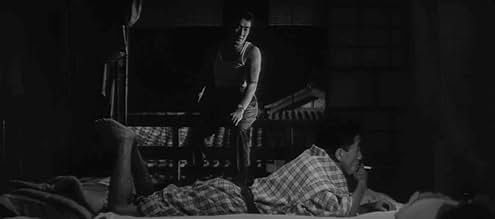Ajouter une intrigue dans votre langueTwo cops on stakeout wait for a murderer.Two cops on stakeout wait for a murderer.Two cops on stakeout wait for a murderer.
- Prix
- 3 victoires au total
Photos
Zen'ichi Inagawa
- Postman
- (as Zenichi Inagawa)
Histoire
Le saviez-vous
- ConnexionsVersion of Harikomi (1991)
Commentaire en vedette
Minoru Ôki and Seiji Miyaguchi rush to catch the train on a hot day. It's a long ride to a distant city, and it takes them several stops to find seats. They're detectives in pursuit of a murder accomplice with a gun. Their best shot is that he's going to visit Hideko Takamine, his old girl friend. She's married now, and stepmother to three children, living a passionless life of dull routine.
Yoshitarô Nomura's 2-hour movie confronts the issue of how to show a slow, motionless stakeout without boring the audience. There's trouble with the management of the inn they are staying at, and the backstory is filled in via short flashbacks: not only the investigation that led them here, but Ôki's personal life. He wants to get married, but feels he can't afford a wife. This fills up and varies the still routine of the first hour, in which nothing seems to happen; it's expository cinema.
The story we see is not merely one of police hunting the criminal. It's a long journey of self-realization and the subjects of the cops' investigation reflect back on the cops. It's clever and telling technique, marred somewhat by a voiceover by Ôki, telling the audience what he is thinking. Some of it seems to be necessary, and then enough more to avoid showing it as a kludge. After a while, though, it seems mildly contemptuous of the audience, as if we cannot see and hear what is happening on the screen without being told.
It's a very good movie, and if it isn't great, it's because it's a mass of technique, story-telling technique, camera technique, acting technique that is just a little too much. "We are very clever" the film makers seem to say, "And we're going to explain to you why we're clever, because otherwise you'd never notice." I'm a great believer in the art that hides art, and while it's good to see it out in the open, I'd rather figure it out myself and feel clever.... if not as clever as the film maker.
Yoshitarô Nomura's 2-hour movie confronts the issue of how to show a slow, motionless stakeout without boring the audience. There's trouble with the management of the inn they are staying at, and the backstory is filled in via short flashbacks: not only the investigation that led them here, but Ôki's personal life. He wants to get married, but feels he can't afford a wife. This fills up and varies the still routine of the first hour, in which nothing seems to happen; it's expository cinema.
The story we see is not merely one of police hunting the criminal. It's a long journey of self-realization and the subjects of the cops' investigation reflect back on the cops. It's clever and telling technique, marred somewhat by a voiceover by Ôki, telling the audience what he is thinking. Some of it seems to be necessary, and then enough more to avoid showing it as a kludge. After a while, though, it seems mildly contemptuous of the audience, as if we cannot see and hear what is happening on the screen without being told.
It's a very good movie, and if it isn't great, it's because it's a mass of technique, story-telling technique, camera technique, acting technique that is just a little too much. "We are very clever" the film makers seem to say, "And we're going to explain to you why we're clever, because otherwise you'd never notice." I'm a great believer in the art that hides art, and while it's good to see it out in the open, I'd rather figure it out myself and feel clever.... if not as clever as the film maker.
- boblipton
- 19 sept. 2018
- Lien permanent
Meilleurs choix
Connectez-vous pour évaluer et surveiller les recommandations personnalisées
Détails
- Durée1 heure 56 minutes
- Couleur
- Mixage
- Rapport de forme
- 2.35 : 1
Contribuer à cette page
Suggérer une modification ou ajouter du contenu manquant





























